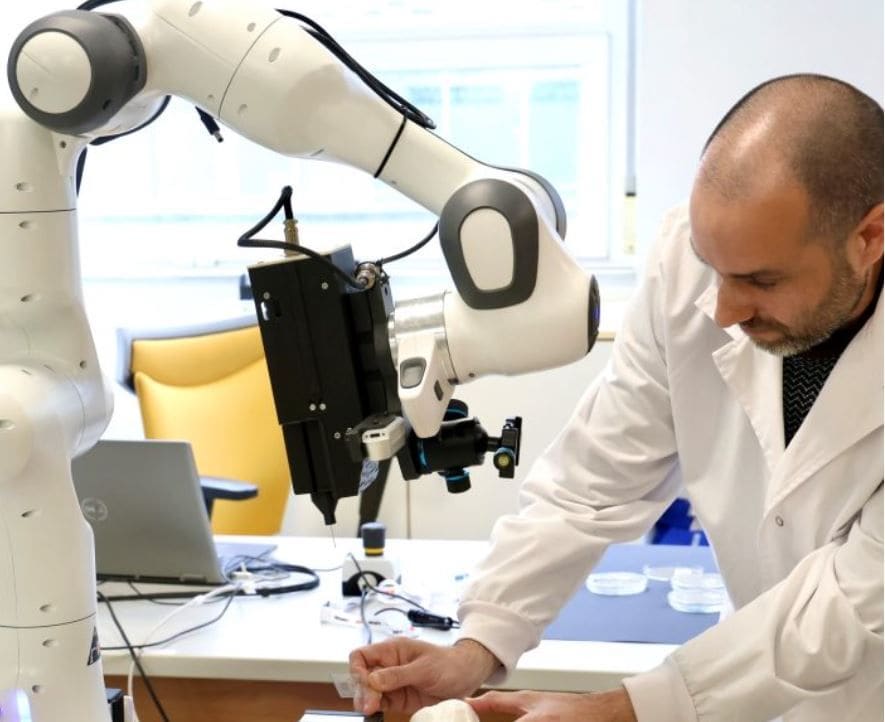The technology research and development center TECNALIA has presented pioneering medical robotic technologies to more than 50 people, from Basque and national companies, with the aim of enhancing the competitiveness of the sector and, at the same time, offering a greater social impact by improving the quality of life of individuals.
The goal is to put technology at the service of health, and to do so, it develops technological solutions that allow companies to have cutting-edge tools in terms of precision, aimed at improving quality of life and health, through rehabilitation or prevention, among others.
According to Andrea Sarasola, researcher and Health projects manager at TECNALIA, “robotics can solve problems that are unresolved. Medical technologies are products, services, or solutions that are used to improve people’s lives and health. In their multiple forms, they accompany you at all times, from prevention to diagnosis and treatment.” The challenge is to develop robots that can adapt to the needs of each user or company and help them to be more competitive. In fact, some of these robots can have applications not only in the healthcare sector but also in the industrial sector.
Among the technologies presented, highlights include: a robotized system for 3D bio-printing for cartilage implants, robotic systems both for stroke rehabilitation and to function as a third artificial limb, teleoperated robots for extreme surgical precision, and a novel service for evaluating the use of exoskeletons as a tool for occupational prevention.
The robotized 3D bio-printer developed by TECNALIA performs cartilage implants directly on the patient during surgery, printing with bio-inks made of biological material that follows the same geometry as the bone defect and is also biocompatible with the patient, thus avoiding rejection of the implant. Currently, models are being printed in laboratories, and even implants that are later grafted into the patient during surgery.
During the event, a robotic exoskeleton for rehabilitating stroke patients, based on biosignals, was also presented. The system connects the patient’s movement intent, decoded through electrical signals from their brain and/or muscles, with the movement of an exoskeleton attached to their paralyzed arm, thus activating the neuroplasticity mechanisms that allow humans to relearn a lost function after a stroke.
Companies have also been introduced to another robotic arm that functions as a third artificial limb. In the healthcare field, it is a tool with which surgeons could carry out tasks that require specialized synchronization by manipulating three surgical instruments. It also has a place in other areas, for manipulating objects, for example, in industrial and artisanal environments, and even for controlling computers and mobile phones.
Furthermore, TECNALIA has presented a teleoperated robot that repeats the movements made by the arms and hands of the person using joysticks. It can also receive the tactile sensation of grip and strength on the piece, thanks to force sensors located in the robot’s claws. There are already commercial robots used in surgeries that improve the surgeon’s precision and ergonomics in minimally invasive operations. They are also used in other sectors for handling hazardous materials or in environments posing risks to humans.
Finally, the Medical Technologies team has explained how evaluations of exoskeleton use are carried out, adapted to the needs of individuals as a tool for occupational prevention. This evaluation, a pioneer in the market, measures the impact of exoskeleton use in the workplace and improves ergonomics. This technology is capable of adapting to the needs of companies to enhance prevention in terms of occupational health.
About TECNALIA
TECNALIA is the largest applied research and technological development center in Spain, a reference in Europe and a member of the Basque Research and Technology Alliance. It collaborates with companies and institutions to improve their competitiveness, the quality of life of people, and achieve sustainable growth, thanks to a team of over 1,500 people committed to building a better world through technological research and innovation. This is why TECNALIA’s research has a real impact on society and generates benefits in the form of quality of life and progress. Its main areas of action are: smart manufacturing, digital transformation, energy transition, sustainable mobility, health and food, urban ecosystem, and circular economy.
In the latest brand awareness and positioning study conducted by the European Research Survey ERS in 2022, TECNALIA ranks first in brand awareness in R&D+i.

